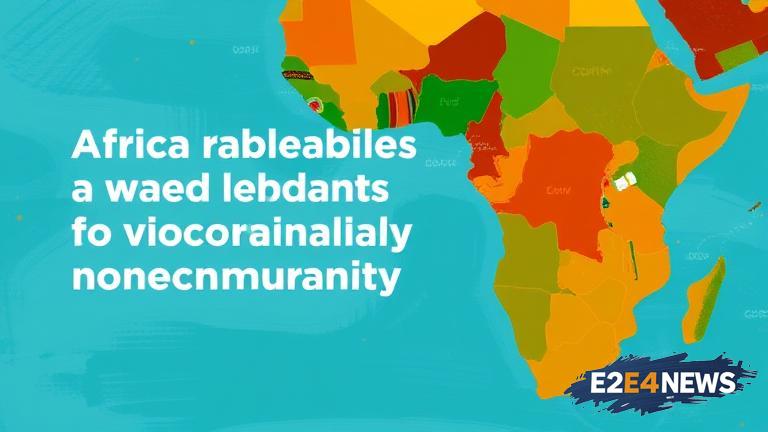Noncommunicable diseases, such as cancer, diabetes, and heart disease, are on the rise in Africa, posing a significant threat to the continent’s health and economic development. According to the World Health Organization, noncommunicable diseases account for over 40% of all deaths in Africa, with the majority being premature and preventable. The economic burden of noncommunicable diseases is also substantial, with estimates suggesting that Africa loses over $3 billion annually due to lost productivity and healthcare costs. To address this growing health crisis, African countries are being urged to prioritize domestic financing for noncommunicable diseases. This call to action comes as many African countries rely heavily on international aid to fund their healthcare systems, leaving them vulnerable to fluctuations in global funding trends. By investing in domestic financing, African countries can ensure a more sustainable and predictable approach to healthcare funding. Furthermore, domestic financing can help to build stronger, more resilient healthcare systems that are better equipped to respond to the unique needs of their populations. Experts argue that African countries have the potential to generate significant revenue through domestic financing, citing examples such as taxes on tobacco and sugar-sweetened beverages. These taxes not only generate revenue but also help to reduce the consumption of unhealthy products, thereby preventing noncommunicable diseases. In addition to taxation, African countries can also explore other domestic financing options, such as public-private partnerships and social health insurance schemes. These innovative financing models can help to increase access to healthcare services, particularly for vulnerable populations such as the poor and elderly. Moreover, domestic financing can help to promote healthcare innovation and research, enabling African countries to develop new treatments and technologies tailored to their specific needs. The African Union has also launched several initiatives aimed at promoting domestic financing for healthcare, including the African Health Strategy and the Global Fund to Fight AIDS, Tuberculosis and Malaria. These initiatives provide a framework for African countries to develop and implement sustainable healthcare financing strategies. Despite these efforts, many African countries still face significant challenges in mobilizing domestic financing for healthcare. Limited economic resources, inadequate infrastructure, and competing priorities are just a few of the obstacles that must be overcome. To address these challenges, African countries must work together to share knowledge, expertise, and best practices in domestic financing. International partners can also play a critical role in supporting African countries to develop sustainable healthcare financing systems. By providing technical assistance, capacity-building programs, and financial support, international partners can help to strengthen African healthcare systems and promote domestic financing. In conclusion, prioritizing domestic financing for noncommunicable diseases is crucial for African countries to address the growing health crisis and promote sustainable healthcare development. By investing in domestic financing, African countries can build stronger, more resilient healthcare systems, reduce their reliance on international aid, and promote healthcare innovation and research. As the African continent continues to grow and develop, it is essential that healthcare financing is prioritized to ensure that all Africans have access to quality, affordable healthcare services. The time to act is now, and African countries must work together to develop and implement sustainable healthcare financing strategies that prioritize domestic financing. This will require strong leadership, commitment, and collaboration from governments, international partners, and civil society organizations. Only through collective action can Africa hope to combat the growing burden of noncommunicable diseases and promote a healthier, more prosperous future for all. The World Health Organization has also emphasized the importance of domestic financing in achieving universal health coverage, citing examples of successful healthcare financing reforms in countries such as Rwanda and Ghana. These countries have implemented innovative financing models, such as community-based health insurance schemes, to increase access to healthcare services and reduce out-of-pocket expenses. Other African countries can learn from these examples and adapt them to their specific contexts. Additionally, the private sector can play a critical role in supporting domestic financing for healthcare, through investments in healthcare infrastructure, technology, and human resources. By partnering with governments and international organizations, the private sector can help to promote healthcare innovation and increase access to quality healthcare services. Overall, the importance of domestic financing for noncommunicable diseases in Africa cannot be overstated. It is essential that African countries prioritize domestic financing to build stronger, more resilient healthcare systems and promote sustainable healthcare development.
